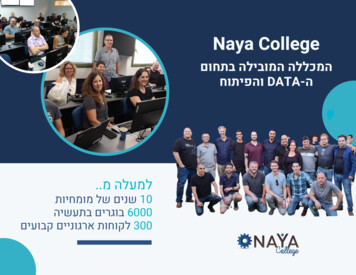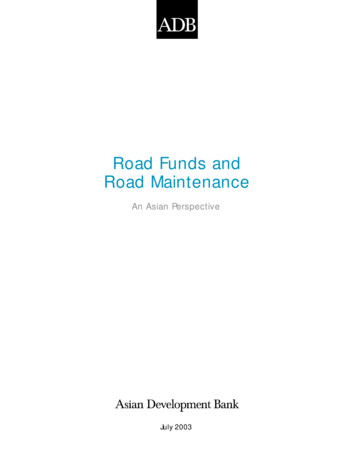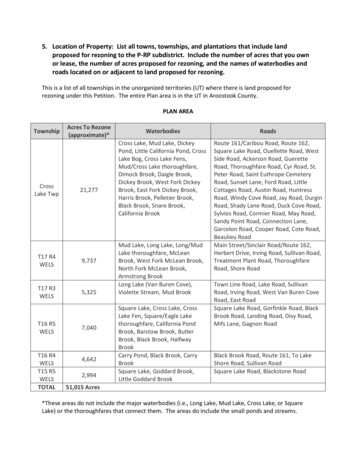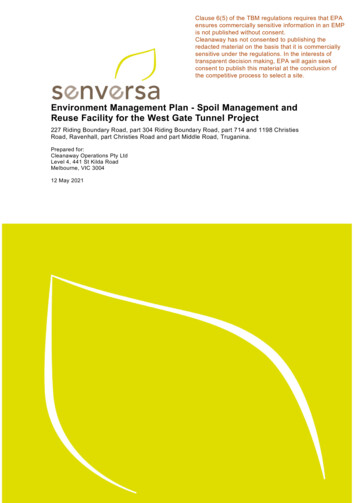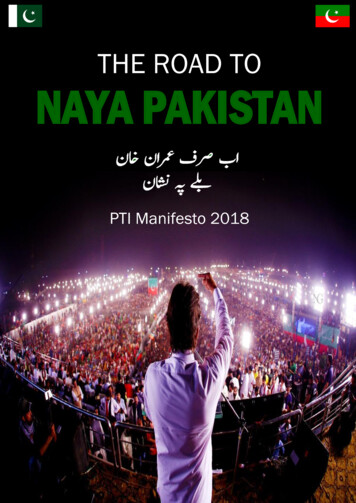
Transcription
0THE ROAD TONAYA PAKISTANPTI Manifesto 2018-0-
-1-
ContentsChapter 1: IntroductionPTI’s VisionOur achievements and lessons from governing Khyber PukhtunkhwaChapter 2: Transform GovernanceBring accountability to the core of governmentEmpower people at the grassroots through local governmentDepoliticise and strengthen PoliceReform the criminal justice system and provide speedy access to justiceReform the Civil ServiceInstitutionalise E-Governance practices in public administrationFacilitate delivery through legislative reform (Right to Information, Right toServices)Reform government procurementEnsure freedom of the PressChapter 3: Strengthen the FederationConsolidate integration of FATA with KPChampion reconciliation in BalochistanSpearhead creation of a South Punjab province along administrative linesTransform KarachiPolitical and socio-economic empowerment of Gilgit BaltistanAlleviate poverty across Pakistan's poorest districtsEnsure constitutional rights for minoritiesPromote gender parityEnsure a greater stake for Overseas PakistanisChapter 4: Inclusive Economic GrowthReform FBRCreate 10 Million jobs and strengthen the labour marketImplement policy framework to build five million housesMake Pakistan business-friendlyRevive manufacturing and facilitate rapid growth of the SMEsTransform key economic institutionsFix Pakistan's energy challengeEnsure CPEC translates into a game changerEnhance Access to Finance for citizens and industryBoost the tourism industryTurnaround IT sector to build a knowledge economy-2-
Strengthen international tradeRevitalise textile sector and boost exportsChapter 5: Uplift Agriculture, Build Dams and Conserve WaterUnleash Pakistan's potential in agricultureRevamp the livestock sectorBuild dams and solve Pakistan’s water scarcity challengeRevive our fisheries industryChapter 6: Revolutionise Social ServicesHealthcare for allTransform educationUnleash the potential of the youthExpand the social safety netProvide clean drinking water for allTackle climate change and champion green growthCreate a more caring Pakistan for people with special needsTackle the population growth challengePromote arts, sports and cultureChapter 7: Ensure Pakistan’s National SecurityExternal DimensionStructural reforms and policy principlesInternal DimensionStructural reforms and policy principlesDefence policy-3-
“We should have a State inwhich we could live and breatheas free men and which we coulddevelop according to our ownlights and culture and whereprinciples of Islamic socialjustice could find free play.”Quaid-e-AzamMuhammad Ali Jinnah بنگرپ ٹچونںںیم ڈارٹکالعہمدمحماابقل -4-
CHAPTER ONEIntroduction-5-
PTI’s VisionThe Movement for Justice/Pakistan Tehreek-i-Insaf (PTI), was envisaged as a Movementto fight for a just and equitable society based on the system that Prophet Mohammad(PBUH) laid down in the Medina Charter, which was the foundation of the model Islamicstate, an egalitarian society based on the rule of law and economic justice – the firstwelfare state in the history of mankind. Unfortunately, as the Muslim philosopher Ibn-eKhaldun predicted: when the Muslims’ commitment to justice declined so did theircivilisation.It is these principles of justice and egalitarianism that Quaid-i-Azam Mohammad AliJinnah envisaged for Pakistan and it is these principles which are the foundation of PTI.For PTI, it is not just “politics”: it is a commitment to building a welfare state where therule of law, meritocracy and transparency are guaranteed to all citizens - where a socialwelfare safety net is provided to the marginalised and the elderly.A just order is the foundation for creating a nation where equal opportunity exists for allcitizens in all fields – from health to education to security of life and property. Justiceensures women, minorities, the poor, the differently-abled, the dispossessed anddisadvantaged are not exploited by the powerful or discriminated against.PTI is the Party of the ordinary Pakistani toiling hard to make a better future forhimself/herself and his/her family. PTI stands committed to providing that futurebecause it sees the people of Pakistan as the wealth of Pakistan. That is why PTI hasalways dedicated itself to the welfare of all the people of Pakistan without discriminationon the basis of race, ethnicity, origin, gender, or religion.PTI stands for an effective government with merit and responsiveness as the guidingprinciples. PTI strongly believes that an ineffective state structure has generated a crisisof governance that has effectively marginalised everyone in the country except a smallelite. Therefore, PTI will end this corrupt and decaying system to build anew on thefoundations of Justice and Equity. The legacy of misrule and misery by a corrupt ineptelite will be relegated to the dustbin of history.PTI also recognises the scourge of terrorism and its devastating effect on Pakistan andits citizens not only in terms of the massive loss of Pakistani lives but also in a oncetolerant society becoming polarised into intolerance, fear and hate. PTI standscommitted to restoring the spirit of tolerance and acceptance amongst all the citizens ofPakistan.Pakistan Tehreek e Insaf has a mission to change the status quo destructive politics inPakistan. It has never and will never seek compromises for the sake of power. Hence its-6-
refusal to compromise on its principles and ideology of Justice and Change: A NayaPakistan built on Iqbal’s dream and Jinnah’s vision – encapsulated in an Islamic WelfareState. A Pakistan where all are equal before the law and where all have equal access tohealth, education and opportunity in every field. A Naya Pakistan that will place the lifeand dignity of all its citizens above all else.PTI’s vision is a Naya Pakistan that is confident in itself and at peace with its neighbourson the basis of mutual reciprocity. A Pakistan that seeks friendly relations with all stateson the basis of transparency, mutuality of interests and respect for sovereignty. A NayaPakistan that will be premised on a strong strategic deterrence but will seek conflictresolution. A Naya Pakistan that will not fight others’ wars or act as a surrogate for anypower.These guiding principles and commitments are reflected in the Manifesto that is beingplaced before the people of Pakistan. It is a commitment to ensure that every Pakistanifeels empowered and has control over his/her own destiny. Power will devolve to thepeople so that they take control of their own lives within a just and equitableenvironment. Naya Pakistan is a message not only of hope but of a promise by PTI for thedeprived, the dispossessed, the discriminated against, for all the people of Pakistan.Unlike in 2013, today PTI speaks with a voice of confident experience as it has justended its first term as a government – in the province of Khyber Pukhtunkhwa (KP). PTIhas learnt many lessons in the process of governing KP province where it unfolded itsNaya Pakistan agenda. Despite forming a government for the first time, PTI was able tobring about meritocracy and reforms in the police system, the health and educationsystems and in the civil judicial system. PTI’s police reforms in KP have depoliticised thepolice force by making recruitment purely on a professional and merit-based system. Thepositive impact of this revolutionary change in how a police force functions hasresonated across the country as a model for other provinces to follow. Reforms inprimary and secondary education have shown that public schools can attract studentsaway from private schools. PTI’s commitment to the environment was reflected in theinternationally acclaimed Billion Tree Tsunami programme, which also financiallyempowered women as they took charge of the programme at the local level. PTI alsodelivered on its commitment to devolve decision-making and financial power to thevillage level through its Local Government law. PTI has also learnt from the pitfalls itconfronted in governance in KP and today it stands strengthened by this experiencebolstering its commitment to its core principles.Today PTI stands poised to deliver on its commitments that it made when the Movementfor Justice began in 1996, to the people of Pakistan.Imran KhanChairmanPakistan Tehreek-e-Insaf-7-
KP 2013-2018ACHIEVEMENTS-8-
-9-
- 10 -
CHAPTER TWOTransform Governance- 11 -
Bring accountability to the core of governmentWe will ensure full autonomy for, and build the capacity of, the National AccountabilityBureau (NAB) and other accountability institutions and pursue all major corruptionscandals regardless of political affiliation.Previous national governments have intentionally stifled accountability institutions tocreate an environment in which corruption by the ruling elite is concealed rather thanaggressively pursued.In order to strengthen NAB, we will: Review the NAB Ordinance to strengthen its mandate, independence andthe appointment process for the NAB Chairman. Support the NAB Chairman in conducting an organisational reform focusedon “people, processes and systems”. Address legal lacunas in the accountability laws including reviewing“voluntary return” and “plea bargain” provisions. Support NAB to define & track Key Performance Indicators to boostperformance e.g., transparency & corruption score, number of references,time to prosecution, spending vs. recovery ratio.We will build a Special Task Force to launch a drive to recover looted nationalwealth parked in offshore tax havens by leveraging recent changes in TaxInformation Agreements, Unexplained Wealth Orders and Illicit Assets Acts byforeign governments and International Organisations.We will strengthen other accountability institutions including the Auditor General’sOffice and FIA as well as parliamentary bodies especially the Public AccountsCommittee.Empower people at the grassroots through local governmentWe will transform Pakistan by devolving power and decision-making to the peoplethrough an empowered local government.Local development in villages and small towns in Pakistan is controlled by MPAsand MNAs, or by the bureaucracy, who do not want to cede authority andrelevance.We will devolve small infrastructure initiatives to village councils by transferringresources and decision-making power to the people of Pakistan by scaling out oursuccessful KP model across Sindh, Punjab and Baluchistan.- 12 -
Learning from our KP experience, we will further refine the LG structure, andintroduce a city government model, where the directly elected Mayor will beresponsible to deliver on all interrelated urban city matters.Depoliticise and strengthen policeWe will enforce depoliticisation of police by building upon KP’s successful police reformmodel, which will be replicated nationally.Police in Pakistan is ill-equipped, poorly trained, deeply politicised, and chronicallycorrupt. Police reforms have been neglected by successive governments tocontinue using the force as a political tool.To reform the police, we will: Replicate the KP Police Act of 2017 across other provinces and appointprofessional Inspector Generals to lead the depoliticisation of policesimilar to KP. Professionalise police hiring and career management, ensuring no politicalinfluence on policing in all matters from hiring, posting, and transferring ofpersonnel. Replicate KP’s success in creating specialised training institutions. We willalso invest in new policing systems and processes by trackingperformance, equipping districts with modern surveillance /command andcontrol centres. Make public outreach to police easier through new and enhanced policingapps, SMS systems, online FIRs and call centres. Establish Women police stations and desks at all levels to facilitate womenempowerment.We will scale up the existing KP model of Alternate Dispute Resolution(ADR) Councils at tehsil levels, by rolling out the KP DRC model nationally to allowconflict resolution for small crimes right down at the tehsil level and police stationlevel.Reform the criminal justice system and provide speedy access tojusticeWe will launch a judicial reforms programme that will provide speedy and quality justicefor all citizens.- 13 -
Laws and procedures in Pakistan are weak, archaic, ineffective and have beenamended in a piecemeal manner. Weak implementation of laws and procedureshas led to delays in case resolutions. In addition, capacity constraints haveresulted in a national caseload backlog of over 2 million cases.We will work with the judiciary to champion a programme to rapidly dispense thebacklog of existing cases, through providing necessary resources and trackingsystems.We will champion reforms in the Code of Civil Procedure in consultation with HighCourts to ensure speedy justice, in line with KP reforms, to dispose all civil courtcases within a timeframe of one year.We will also propose amendments to the Criminal Procedure Code to reduceprocedural delays. Additionally, we will also promote access to justice byamending outdated laws.We will carry out an audit of existing federal and provincial women protection lawsto identify gaps and undertake legal reforms as part of our commitment to womenempowerment.We will support reform initiatives to improve the operational performance ofcourts. This will include supporting courts to digitise case records, casemanagement reforms, and the establishment of an institution to provide free legalaid to needy litigants as well as to vulnerable groups like women, juveniles andminorities.We will reform our prison system by upgrading existing infrastructure and ensurehuman rights are not violated. Moreover, we will establish separate specialjuvenile detention centres and prisons for women.We will modernise parole rules with necessary checks and balances so that jailscan be transformed into reformatories entailing a duty of the state to rehabilitateprisoners housed in jails for more than a year.Reform the Civil ServiceWe will transform the civil service into a merit based, depoliticised cadre ofprofessionals.Civil service in Pakistan has seen 38 major reforms in the last 70 years. Thesereforms have not been able to depoliticise the service, or attracted bright youngtalent on merit, and technical expertise.The implementation of civil service reforms is our priority and we will:- 14 -
Assign the right officer to the right job without any political consideration,tenure protection of officers, internal accountability, along with aperformance audit and a review of the compensation package.Allow lateral entry into the service of competent professionals.Ensure compulsory retirement after 2 supersessions through a transparentmechanism.Institutionalise E-Governance practices in public administrationWe will transform public administration with E-Governance initiatives to facilitatecitizens’ access to justice, rights and other public services.Governance in Pakistan continues to rely almost entirely on obsolete recordkeeping practices that are not reliable, transparent and efficient to work with.There are multiple issues in the governance system of Pakistan: inefficient datacollection systems, record keeping, intra-coordination between variousdepartments, black economy, tax evasion, and bureaucratic hurdles in solvingpublic issues in federal and provincial levels.We will ensure full capitalisation of digital financial services to supplementdigitisation of documentation.We will establish a whistle-blowers programme, which will be facilitated throughthe use of a community call centre where a dedicated phone line will be availablefor citizens to report suspicious behaviour by individuals or entities.We will complete electronic mapping of property, linking it to the owner’s CNICand thereby to his/her legal heirs.We will further improve the Safe City Project to ensure solid enforcement of trafficlaws and digitisation of traffic violation tickets.We will adopt electronic paper and data archiving of all future legal cases andprogressively create an image database for records of the past ten years.We will digitise monitoring and evaluation of socio-economic indicators withperformance management capability of district and village councils.Facilitate delivery through legislative reform (Right to Information,Right to Services)We will abolish the culture of secrecy and will ensure that all government actions,records and information are open to public scrutiny. PTI will support transparency andaccountability in government as per standards practiced internationally.- 15 -
Despite constitutional provisions and the 2002 Freedom of Information Ordinancebeing in effect, access to information that needs to be made public is verydifficult. This results in weak accountability and deepens the distrust between thecitizen and the state.We will allocate resources and build public sector capacities to effectivelyimplement Right To Information (RTI) laws.We will ensure the timely production of budget processes in line with internationalstandards and ensure public access to key budget documents.We will ensure that the executive budget proposal and the enacted budget withcomprehensive data will be produced before citizens.We will ensure that in-year and mid-year reports as well as audit reports areproduced in a timely manner, and made available for public scrutiny.We will create effective mechanisms to deal with citizen’s complaints about lackof or limited access to information.Reform government procurementWe will reform public processes such as procurement to generate more value formoney and transparency.The existing national and provincial procurement rules lack transparency,technical expertise and public disclosure. These are the challenges with the publicprocurement framework in Pakistan.In order to reform procurement, we will: Incentivise provinces to transition to E-procurement to generate morevalue for money through increased competition. Build capacity within public departments, law enforcement andaccountability institutions to ensure compliance with procurement rulesand procedures. Create a culture of transparency for public procurement by providing publicdisclosure and strengthening accountability mechanism.Ensure freedom of the PressWe are committed to maintaining a vigorous free media, which will evolve its own rulesto ensure responsible journalism both in the electronic and print media.- 16 -
We will ensure laws for timely implementation of Wage Board decisions and forensuring that media houses pay journalists their salaries and bonuses on aregular and timely basis.We will also ensure that media owners provide insurance, training and protectivecover for their journalists working in conflict zones in particular and in the field ingeneral.PEMRA will be made autonomous so it does not become a political tool in thehands of any government to target the freedom of the electronic media.Government advertisement will be rationalised and not be made a tool to harassor bribe the independent media.PBC and PTV will be made autonomous with their own Board of Governors similarto the BBC model.- 17 -
CHAPTER THREEStrengthenthe Federation- 18 -
Consolidate integration of FATA with KPWe will ensure equal rights and respect for the residents of tribal areas by consolidatingFATA’s merger with KP and allocating special development funds for this purposeThe people of the tribal areas have lagged behind in socioeconomic and humandevelopment due to the prolonged neglect by the state, which has resulted indeveloping a sense of deprivation and mistrust. Moreover, the tribal areas haveexperienced the worst violence since 9/11 in the form of drone attacks, militaryoperations against terrorists, and suicide attacks by militants. This has resulted inthe killing of thousands of civilians and law enforcement personnel, and loss toproperty worth billions of rupees.Now that the law for integrating FATA with KP has been passed by the parliament,we will ensure that the integration takes place smoothly.We will hold local body elections in 2018 to empower people right down to thevillage council level.We will launch a Mega Development Plan by allocating 3% of federal divisible poolon annual basis by fully associating the people in formulation and execution ofthe plan.We will ensure job creation in the tribal areas, especially with investments toharness natural resources of the region.Champion reconciliation in BalochistanWe will empower the Balochistan government to launch and champion large-scaleefforts for political reconciliation. In particular, we will ensure significant localparticipation and stake in development projects, especially in Gwadar.Balochistan as a province has largely been neglected. The population has notbeen part of major development projects and employment opportunities arescarce. This has resulted in poor socioeconomic and human development.Furthermore, Balochistan has the highest incidence of poverty when compared toother provinces.We will reach out to the Baloch leadership and the disgruntled Baloch groups,especially the youth by ensuring them political and economic empowerment.We will develop and implement a plan to include the local population in CPEC anddevelopment of Gwadar.- 19 -
Spearhead creation of a South Punjab province alongadministrative linesWe will develop a national consensus on the creation of a South Punjab province onadministrative grounds with the objective to lift 35 million people out of poverty, as wellas to create an administrative balance between Pakistan’s federating units.South Punjab has been neglected for decades, especially in the last 5 years sincemajority of the development funds were allocated to Central Punjab. As a region, SouthPunjab constitutes 32% of the population of Punjab province and is lagging behind restof the Punjab on a number of human development indicators (HDIs). The incidence ofpoverty in D.G. Khan, Bahawalpur and Multan divisions serve as testament as poverty ishighest in these divisions of Punjab.We are committed to creating South Punjab province on administrative basis thatrespects the wishes of both, the people of Punjab as well as each of the otherfederating units of Pakistan.We will create political consensus by engaging political parties, people of Punjabprovince and the rest of Pakistan, including other stakeholders.Upon reaching consensus, we will pass legislation from the provincial assembly,and then from the two houses of parliament in Islamabad to create the legalframework for the creation of South Punjab province.We will launch an economic package for the new province to provide support inestablishing the requisite infrastructure and institutions.Transform KarachiWe will transform Karachi into a vibrant competitive megacity through large-scalereforms in governance and with the provision of public services such as housing, masstransit, water and sanitation. We want to make Karachi the urban jewel of Pakistan.Karachi is Pakistan’s economic engine, but it has suffered from over two decadesof consistent neglect and mismanagement. Population density is very high, with20,000 people per square kilometre whereas infrastructure is weak. Karachi’stransit systems are underdeveloped, with a competition of 45 citizens per busseat, compared to 12 in Mumbai. Water is scarce, as only 55% of daily waterneeds are met due to the monopoly structure in place by a water mafia.Approximately half of Karachi’s citizens have access to sanitation. The root causeof Karachi’s poor state is its poor local governance systems, which is neitherempowered nor resourceful enough to resolve these issues.We will launch a new city governance model for Karachi that empowers localelected officials and a city government.- 20 -
We will depoliticise Karachi’s police service and implement a merit-basedprofessional system to improve management.We will continue to work on the national action plan and will begin crack-down onland & bhatta mafias in collaboration with the Sindh Rangers and civil/localgovernment.We will provide clean drinking to all Karachi residents and implement plan tosolve Karachi water problems. In the process, we will crack down on the watermafia, illegal connections on public pipelines and champion the development ofdesalination plant.We will aggressively improve waste management and resolve sanitation issues inKarachi through a component sharing model with public, private and communityfunding.We will champion housing for the urban poor outside of Karachi with efficientcommute infrastructure.We will transform and massively enhance the capacity of Karachi’s mass transitsystem by leveraging on public and private financing.Political and socio-economic empowerment of Gilgit BaltistanPTI recognises the commitment of the people of Gilgit Baltistan (GB) to Pakistan, whichhas been exemplary and is reflected in their sacrifices. We will ensure that the peopleof GB get their due political and economic rights.Gilgit Baltistan suffers from a myriad issues, ranging from lack of economicdevelopment, underrepresentation in CPEC and a centralised bureaucracycoupled with an already disempowered legislative assembly. These issues havesuppressed GBs ability to capitalise on its potential and natural endowment.We will empower people of GB by giving autonomy to the legislative assembly.We will boost local economy with strategic investments in tourism, minerals andrenewable energy.We will provide GB with solid opportunities in CPEC and ensure local participation.Initiate poverty alleviation drive across Pakistan’s poorest districtsWe will establish a special mechanism to supplement existing poverty alleviationefforts in the poorest districts across Sindh, Punjab, KP and Balochistan.- 21 -
Poverty is rampant in Pakistan with 29.5% of the population or close to 60 millionpeople living below poverty line. There is a strong correlation between theincidence of high poverty and poor public delivery. Pakistan's HumanDevelopment Index (HDI) of 0.55 is currently the lowest in South Asia.We will increase funding for the poorest districts through existing povertyalleviation programmes.We will launch a special drive in the poorest districts to improve access tosanitation and clean drinking water.We will provide Sehat Insaf cards and augment the existing BISP programme inthese districts.Ensure constitutional rights for minoritiesPTI will protect the civil, social and religious rights of minorities; their places of worship,property and institutions as laid down in the Constitution.Minorities in Pakistan have consistently been denied their constitutional rights incontradiction to the objective of Quaid-e-Azam’s vision. The result of prevalent andunaccounted for discrimination against minorities (from all walks of life) has led toviolence and their poor socioeconomic and human development.We will enact structural reform to establish a legally empowered, well resourcedand independent National Commission on Minorities, followed by provincialCommissions/Departments.We will ensure equal access to justice and protection from discrimination inmatters of law and order to minorities.We will act against hate speech and violence towards minorities under theNational Action Plan.We will ensure that the minority quota in all government departments shall beimplemented in letter and spirit.We will organise inter-faith dialogue, especially among young people to promotetolerance and harmony.- 22 -
Promote gender parityWe will effectively implement initiatives to increase women’s access to education,healthcare, economic opportunity and legal protection.Pakistan ranks second to worst globally in gender parity by World EconomicForum. This stems from disproportionately poorer access to education, low labourforce participation, high maternal mortality rate and prevalence of violenceagainst women.We will prioritise establishment and upgradation of girls’ schools and providestipends to girls and women for continuing their education.We will establish a large scale national Maternal Health Programme to provideassisted births along with family health and planning information to women.We will provide economic opportunity to women by: Strengthening the legal framework to protect women’s inheritance rights toland and property Increasing state-provided micro-finance available to women Establishing residential and caretaking facilities for working women inurban settingsWe will reform the justice system to: Increase representation of female police officers at police stations forreporting and investigation of complaints/FIRs for gender based crimes Improve investigative and prosecutorial process for gender based violence Establish gender-based violence courts to provide additional protectionand speedy resolution to women victims Improve investigative and forensic procedures for sexual offence cases.We will increase resources and capacity of “Dar-ul-Aman” and protective servicesfor women.We will increase female participation in public sector by establishing significantquotas for women in local government and boards of public bodies.We will empower women politically by launching a women voter registration driveacross Pakistan to ensure the opportunity for women to exercise their right to voteand increase women’s participation in elections.- 23 -
Ensure a greater stake for Overseas PakistanisPTI values the patriotic spirit of overseas Pakistanis and will ensure access to citizenrights and an improved set of infrastructure and services offered by Pakistaniembassies.Overseas Pakistanis are one of our biggest asset, who have consistently beendenied access to their citizens’ rights and to the opportunity to contribute toPakistan’s economy due to inefficient and incomplete processes along with poorquality infrastructure and services by previous governments.We will ensure voting rig
Unlike in 2013, today PTI speaks with a voice of confident experience as it has just ended its first term as a government - in the province of Khyber Pukhtunkhwa (KP). PTI has learnt many lessons in the process of governing KP province where it unfolded its Naya Pakistan agenda. Despite forming a government for the first time, PTI was able to



